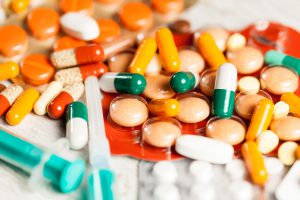What Should I Do With My Old Prescription Drugs?

 Households, healthcare facilities, and pharmacies alike all maintain a stock of medications. Often, these medications become expired or undesired over time, but simply tossing old prescription drugs in the trash can have severe consequences.
Households, healthcare facilities, and pharmacies alike all maintain a stock of medications. Often, these medications become expired or undesired over time, but simply tossing old prescription drugs in the trash can have severe consequences.
Prescriptions that are not safely disposed of can cause harm to individuals who may accidentally or intentionally consume them, and can release toxic chemicals into the environment if they make it to the landfill. Medical Waste Pros offers safe pharmaceutical waste disposal services for your convenience so your medications are never at risk of being dangerous to individuals or the environment.
Let’s take a look at how improper disposal of old prescription drugs can have harmful repercussions and why some disposal practices may not be sufficient enough to prevent these negative consequences.
How Are Old Prescription Drugs Harmful to Others?
While medications are perfectly safe when taken as prescribed by a doctor, they may cause serious harm to an individual when they fall into the wrong hands. Anyone with a weakened immune system—infants, the elderly, and pets—and those who intentionally abuse prescription drugs all face serious health risks when these medications are accidentally or intentionally consumed.
Toddlers and young children are curious, and may put anything into their mouths that looks like candy. This puts them at a high risk for consuming any toxic pharmaceuticals simply because they don’t know better. A report by SafeKids.org found in 2012 that approximately 64,000 emergency medical visits involved a child who had been exposed to medicine. That boils down to one incident every eight minutes.
Pets also easily fall into this same category, as most animals will pick up anything they think is food. Older individuals may become confused and mistakenly take the wrong medications, and intentional abusers can easily cause life-threatening harm to themselves and others.
How Is the Environment Impacted?
Medications are chemical substances, which means they inherently pose a threat to the environment. According to the Associated Press in 2008, pharmaceutical drugs were present in the drinking water of approximately 41 million Americans.
For the same reasons you wouldn’t throw away old batteries or paint thinner, you shouldn’t throw away prescription medications. These chemicals leach into the environment and can have significant implications on present and future generations.
How Should I Dispose of My Old Prescription Drugs?
There are a number of ways people dispose of medications, but only a few ways to do it properly. Here are a few do’s and don’t’s when it comes to getting rid of your old medications:
 Don’t combine your medications with an “undesirable” material—like kitty litter or coffee grounds— before throwing them away. You never know who may find these medications and consume them accidentally or otherwise, and this doesn’t protect the environment from poisoning either.
Don’t combine your medications with an “undesirable” material—like kitty litter or coffee grounds— before throwing them away. You never know who may find these medications and consume them accidentally or otherwise, and this doesn’t protect the environment from poisoning either.
Don’t crush your medications to render them useless before tossing them. Many medications are designed to dissolve slowly into your body so as to avoid overdosing. When you crush medications, you risk exposing yourself and those around you to inhaling the dust of these medications, thus consuming a higher dosage than intended.
Crushing medications may cause crumbs and chunks of medications to scatter about the area as well, making them available to be picked up by unsuspecting children and pets. This also does nothing to prevent these chemicals from entering the environment.
Don’t flush your medications down the toilet. Flushing your medications sends those chemicals directly to the water treatment center, where these drugs are not always filtered out before re-entering the drinking supply.
There is also a limited amount of information regarding how drugs in our drinking water impacts public health. Unless there is an emergency situation and you must dispose of medications immediately, it is much more beneficial to simply store your medications in a locked, secluded container and dispose of them properly.
Do store your medications in a securely locked, well-hidden container that is out-of-reach until you can dispose of them properly. Get in the habit of collecting your medications for large-volume disposals rather than throwing them away on a pill-by-pill basis, and stay vigilant in protecting them from falling into the wrong hands.
Do take your pills to U.S. Drug Enforcement Agency take-back events. DEA authorities will handle your prescription medication disposal for you, but these events occur irregularly and may not be available in all areas.
Do use a mailback prescription waste service so that you can send your old prescriptions as needed to a treatment facility. Mailback services are convenient because you are provided with all the materials you’ll need to properly package and ship your medications directly to a medical waste disposal company.
Mailback Pharmaceutical Waste Disposal
Mailback services are great solutions for pharmaceutical waste in households and healthcare facilities alike. These services allow you to securely dispose of your medications, ensuring your prescriptions don’t cause harm to others or the environment.
With mailback services, all you have to do is properly package and label your waste before shipping. You have control over how often you dispose of your waste rather than waiting for DEA take-back events. The medications will be sent to a disposal company who can treat them before disposal.
Get Free, No-Obligation Quotes on Pharmaceutical Waste Disposal Today
Medical Waste Pros can connect you with a contractor who can help you develop a program that keeps your prescriptions out of the wrong hands. We can even find contractors who provide a number of different services for a variety of needs right in your area.
To get free quotes on medical waste disposal services in your area, fill out the form to the right or give us a call at (888) 755-6370.










